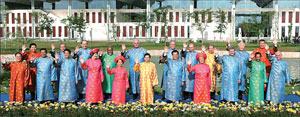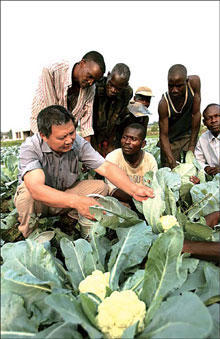China's call to build a harmonious world embodies its firm commitment to work
for peace and progress, Premier Wen Jiabao said while presenting the Government
Work Report at the fifth session of the 10th National People's Congress (NPC) on
Monday.
President Hu Jintao had set the foreign policy goal of a
harmonious world at the United Nations Summit on the 60th anniversary of the
world body in September 2005, and the Chinese government embarked on its
"harmonious world" diplomacy last year.
|

President Hu Jintao (first row, fifth from right) poses for a
photograph with other world leaders in traditional Vietnamese costume at
the APEC forum in Hanoi in November 2006. Chinese leaders have been
participating in such meetings to help evolve policies to make the world a
safe and harmonious place. Xinhua |
What should a harmonious world be? Foreign Minister Li Zhaoxing explained
yesterday that such a world should seek "peaceful, harmonious, scientific and
sustainable development". Addressing a press conference at the on-going annual
session of NPC, Li said: "The initiative conforms to the trend of the times and
to the wish and interests of the people."
The idea of a "harmonious world" is not a whim. Instead, it has evolved out
of China's developmental needs. China may have had a sustained economic growth
for the past 20-odd years, but it's still a developing country looking forward
to the next decade for opportunities of further development, China Institute of
International Studies Vice-Director Ruan Zongze said.
"To avail of the opportunities, China needs an environment of peace and
stability, as well as the capital, technology, resources and markets through
mutually beneficial cooperation for the sustainable development of its economy,"
he said.
So it's necessary for China to evolve an influential development mode that
would create a global political principle of seeking recognition from more
countries, Ruan said. That would help its development mode and values and expand
its cooperation with the international community.
Chen Qimao, director of Research Centre of International Strategy at Shanghai
Jiaotong University, has written in an article that apart from economic
globalization, the world is facing other challenges, too, such as environmental
protection, climate change, drug trafficking, terrorism, epidemics and the
widening gap between the rich and the poor.
"All these global issues," Chen says, "lead to a strong realistic demand for
building a harmonious world and call for a new global concept to meet the
demand." That's exactly where the importance of China's harmonious world concept
lies.
Explaining further, Ruan said China does not believe in the concept of a
harmonious world only in theory, but also in practise.
On the diplomatic front, Li said, China is committed to promoting peaceful
coexistence, equal treatment, mutually beneficial cooperation and common
development. It is committed, too, to pursuing good neighborly relations and
mutual trust, resolving disputes through dialogues and other diplomatic means,
seeking common security and lasting peace.
|

Agricultural expert Yu Daohong gives vital tips to farmers in Kinshasa,
capital of the Democratic Republic of Congo, in this August, 2006 file
photo. China has adopted eight measures to support African countries and
provide them with aid initiatives worth more than $10 billion over the
next three years. Xinhua |
The country wants to boost exchanges with other countries to enrich mutual
knowledge, build a resource-saving and environmentally friendly society and
enhance cooperation in all possible fields. Hence, to put the idea of harmonious
world into practice, it has been working tirelessly to intensify dialogues with
world powers such as the United States and the European Union, strengthen
cooperation with other developing countries like those in Africa and improve
relations with its neighbors.
Last year, China and the US held their first-ever strategic economic dialogue
to prevent economic frictions from getting politicized and to ensure the
stability and sustained growth of the global economy. At the talks, China
adopted eight measures to support African countries and provide them with aid
initiatives worth more than $10 billion over the next three years.
Last October, China welcomed Japanese Prime Minister Shinzo Abe on his
ice-breaking visit and used the chance to improve Sino-Japanese ties that had
deteriorated over the years. High-level visits by leaders of the two countries,
suspended for five years, have resumed since then, with Premier Wen Jiabao
scheduled to visit Tokyo next month.
Xinhua hailed the Beijing summit of the Forum on China-Africa Cooperation in
November, which brought together more than 40 leaders and heads of states from
Africa, as "a successful practice of China in its efforts to build a harmonious
world".
Also last year, China hosted the summit of Shanghai Cooperation Organization
(SCO) member nations, and began drafting cooperation codes for various spheres
of the regional body to legally guarantee a long-term, good neighborly and
friendly cooperation.
For cooperation and progress in Southeast Asia, China presided over the
China-ASEAN Summit that marked 15 years of dialogue and partnership between the
two sides. It raised an all-round cooperation proposal in strategic, economic,
security and cultural spheres, which were later accepted by leaders of the
countries attending the summit.
In South Asia, President Hu Jintao reached a consensus on strategic
cooperation with India during his state visit to that country in November and
decided to institutionalize a high-level bilateral dialogue mechanism.
To help build a harmonious world, China last year assumed more global
responsibilities too, economically and politically, in the face the
multi-challenges facing the world.
Also, the number of aid items and the total amount the Chinese government
gave to countries hit by natural disasters last tear far exceeded those handed
out in the previous years. It also offered emergency aid to disaster victims in
a few developed nations.
China has always mediated between the US and the Democratic People's Republic
of Korea, and helped resume the Six-Party Talks on the Korean nuclear issue in
December after a one-year hiatus. Thanks to its painstaking efforts, the five
other countries the US, the DPRK, the Republic of Korea, Russia and Japan agreed
at the last session of the talks in mid-February on the initial steps to be
taken to denuclearize the Korean peninsula.
China has also played a positive role in the Iran nuclear issue,
Palestinian-Israeli conflict and other regional and international issues. "It
has also become an active mediator in international conflicts and helped
regulate international rules," Chen Xulong, vice-director of the Department of
Strategic Studies of the China Institute of International Studies, was quoted by
the Beijing News newspaper as having said.
(China Daily 03/07/2007 page8)
